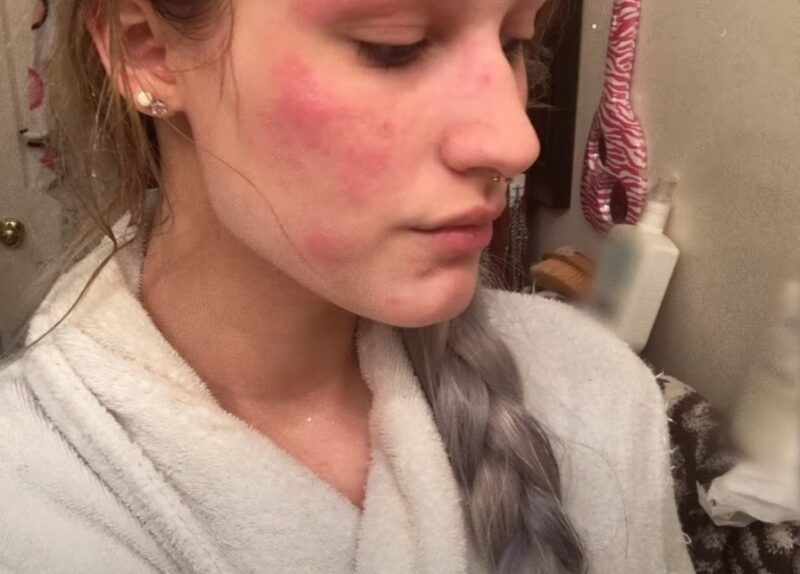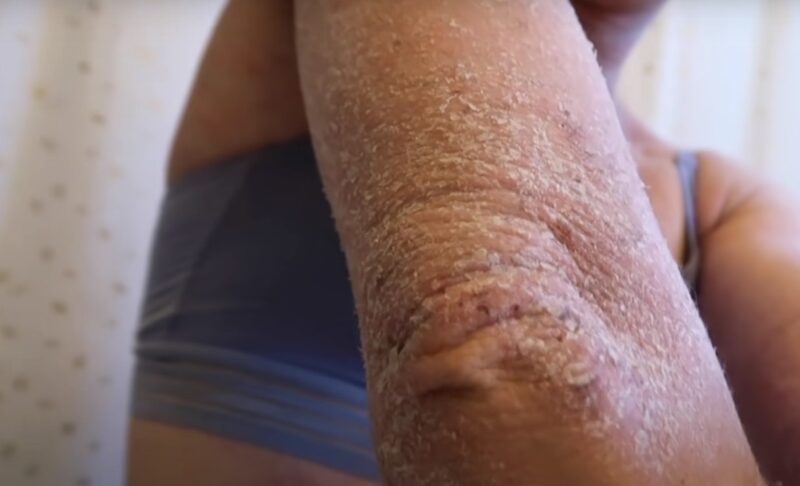Characterized by red, itchy, and inflamed skin, it manifests in varied forms and stages, each requiring distinct management and care tactics. The path to manage and control eczema entails identifying its triggers, symptoms, and the wide range of treatment options.
With appropriate strategies and support, people can achieve relief and enhance their life quality, despite the lack of a cure.
More About the Condition

Also known as atopic dermatitis, it is a chronic skin condition that manifests through patches of itchy, inflamed skin. The severity and symptoms can vary significantly from person to person, making it a uniquely challenging condition to manage. Keep in mind that initial symptoms my have some similarities with hormonal acne, which is another reason to immediately visit a doctor for a proper exam.
According to Kelly Burch, Around 10% of the U.S. population experiences some form of eczema, indicating its widespread impact.
Causes and Risk Factors
The exact cause of eczema remains unknown, but it’s believed to stem from a combination of genetic and environmental factors. Those with a family history of eczema or related conditions, such as asthma or hay fever, are at a higher risk.
Environmental triggers can exacerbate the condition, including but not limited to, irritants like soap, certain fabrics, and allergens, as well as stress and climate changes.
Symptoms and Identification
Eczema symptoms often include dry, sensitive skin, intense itching, red, inflamed patches, and in severe cases, oozing or crusting. These symptoms typically appear on the arms, behind the knees, on the hands, or on the face and scalp in infants.
The itchiness can be particularly severe, leading to a cycle of itching and scratching that may further irritate the skin.
Impact on Life
Beyond the physical symptoms, eczema can significantly affect quality of life. The constant itchiness and discomfort can lead to sleep disturbances, affecting overall health and well-being.
Moreover, the visible nature of the condition can contribute to psychological distress, including anxiety and depression, highlighting the importance of comprehensive care and support.
What Are the Stages And Proper Actions to Take?
Eczema, a condition with dynamic symptoms, progresses through three main stages: acute, subacute, and chronic. Each stage presents unique challenges and requires tailored strategies for effective management.
Acute Eczema

- Characteristics: Acute eczema features intense itching, redness, and swelling. Fluid-filled blisters may appear, causing pain and discomfort.
- Prevention: Avoid known irritants like harsh soaps, detergents, and certain fabrics. Maintain a diary to track flare-ups and identify potential triggers. Use hypoallergenic products to reduce risk.
- Management: Keep affected areas cool to alleviate itching. Wear loose, breathable clothing to prevent irritation.
- Treatment: Apply cold compresses to reduce swelling. Oatmeal baths can soothe irritated skin. Topical steroids may reduce inflammation, while moisturizers help restore the skin barrier.
Subacute Eczema
- Characteristics: This stage shows less inflammation but includes dry, scaly skin. Itching persists, with a burning sensation.
- Prevention: Regular application of moisturizers helps prevent dryness. Avoid extreme temperatures and humid environments that can exacerbate symptoms.
- Management: Continue to avoid irritants. Use gentle skin care products designed for sensitive skin. Keep skin hydrated.
- Treatment: Topical calcineurin inhibitors may help control inflammation without the side effects of long-term steroid use. Moisturizing creams or ointments are essential to repair skin.
Chronic Eczema
- Characteristics: Chronic eczema leads to thick, leathery skin areas, known as lichenification, with cracks or fissures. Itching is a constant issue.
- Prevention: Moisturize daily, even when symptoms are mild. Identify stressors that may trigger flare-ups and seek strategies for stress reduction.
- Management: Adopt a skin care regimen that includes daily baths followed by the application of moisturizers. Wear gloves to protect hands from irritants.
- Treatment: Phototherapy may reduce symptoms and inflammation. Antihistamines help control itching, especially at night. For severe cases, systemic treatments or biologics might be necessary.
Additional Tips
- Diet: Some people find that certain foods exacerbate their eczema. A diet low in inflammatory foods may help. Consider an elimination diet to identify potential food triggers.
- Stress Management: Stress can trigger or worsen eczema. Techniques such as meditation, yoga, and deep breathing exercises can help manage stress levels.
- Environmental Controls: Use a humidifier in dry environments to keep skin from drying out. Avoid sudden temperature changes.
Can You Recover From it For Good?
While a definitive cure remains elusive, substantial improvement and periods of remission are achievable goals. The nature of eczema means it may wax and wane over time, with flare-ups punctuating periods of clear skin. However, understanding and diligent management can lead to prolonged periods without symptoms.
Potential for Long-term Remission
- Genetic and Environmental Factors: Since eczema stems from a combination of genetics and environmental triggers, complete recovery varies. For some, especially children, eczema diminishes with age. Adults might see fluctuations in severity and frequency of outbreaks.
- Lifestyle and Treatment: Consistent care, avoiding triggers, and adhering to treatment plans increase chances for extended remission. Advanced treatments and lifestyle adjustments make long-term control a realistic aim.
Strategies for Sustained Management
- Holistic Approach: Addressing not just the skin but overall health — including stress, diet, and sleep — supports skin health and can reduce flare-ups.
- Regular Dermatologist Visits: Ongoing consultation with a dermatologist helps tailor treatments as the condition evolves or improves.
- Education and Support: Staying informed about eczema and connecting with support networks can provide tips for management and emotional support, which is crucial for long-term wellbeing.
The Reality of “Cure” vs. “Control”
- Understanding “Cure”: In the context of eczema, “cure” implies the complete and permanent absence of symptoms. Currently, medical science offers no such guarantee. The focus remains on control and management, aiming for the best possible skin health and quality of life.
- Emphasis on Control: With the right strategies, many achieve near-normal skin conditions and minimal disruptions to daily life. Success lies in minimizing symptoms and preventing flare-ups through a personalized combination of treatments.
FAQs
What is the biggest trigger for eczema?
There is no single trigger for eczema, as different people may have different sensitivities and reactions. However, some common triggers include stress, allergens, irritants, dry weather, and infections.
Can eczema be caused by stress?
Yes, stress can cause or worsen eczema by increasing the levels of cortisol and histamine in your body, which can make your skin more inflamed and itchy. Stress can also affect your skin barrier function and make it harder to heal.
Does eczema go away with age?
Eczema may improve or disappear with age for some people, especially if they developed it as a child. However, eczema can also persist or recur throughout life for others, depending on their genetic and environmental factors.
What foods are bad for eczema?
Some foods that may trigger or aggravate eczema include food allergens such as soy, dairy, eggs, nuts, wheat, and seafood. Other foods that may contain nickel, cobalt, or other metals that can cause skin reactions include whole grains, legumes, nuts and seeds, meat, dairy, fruits and vegetables, cocoa, chocolate, tea, and coffee.
Summary
Eczema, with its varied stages, affects individuals differently, necessitating a personalized approach to management and treatment. Understanding each stage and implementing appropriate prevention, management, and treatment strategies can significantly improve the quality of life for those affected.
Collaboration with healthcare providers, especially dermatologists, ensures that treatment plans are effective and tailored to individual needs. With proactive management, individuals with eczema can lead comfortable, fulfilling lives.

